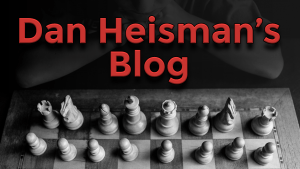Q&A with Coach Heisman Oct 12, 2012
One of the main questions on tonight's show involved "How much does X help my chess?" where X was Chess960, Correspondence Chess, or something else.
My first reaction is that everything that is "chess work" helps your chess, but the real question is, "How much does it help?" A practice that may gain you 1 rating point for each 100 hours of work helps your chess, but that's fairly low return per unit time.
Chess ability consists of numerous skills, many which support your overall analytical skill. So any activity X that helps you develop one or more of those skills is going to be helpful. For example, let's suppose that correspondence chess is just like your "help" target (let's say slow chess) with three main exceptions:
- You are allowed the move the pieces,
- You can use books and databases (but usually not engines) for openings and endgames, and
- You have up to three days to make a move.
Each of these has some affect on your regular play. In a "real-time" game you are not allowed to look up your openings, but correspondence rules have the benefit of helping you learn openings during the game. In a real-time game you can't move the pieces, so that forces you to practice visualization. In a correspondence game you have much more time, so your criticality and time management skills are not stressed or tested as much. The net result is that correspondence chess is just different, and of course should help your slow chess, but certainly not as much in the areas (like visualization or time management) where the rules are laxed. However, this is offset by benefits of correspondence chess, such as superior opening preparation and more meticulous, time-consuming analysis. The net result is that is certainly won't hurt and probably will help quite a bit. Besides, who's to say that activity X is being done to help your "regular" chess at all? For example, if correspondence chess is fun, then that is one sufficient end goal in itself.
We could perform this analysis on Chess960 (openings are not "book" but otherwise the other practices are identical so the benefits are obvious) or any other chess activity.
One chess activity I like to support as helpful are problems where you don't have to find "good" moves like "play and win" or "play and mate" or "play and mate in 2". For example, in the following Jeff Coakley puzzle you are asked to switch ANY two pieces on the board and leave Black in a legal checkmate (meaning, for example, no pawns of either color are allowed to be switched onto the 1st or 8th ranks):
(Answer at the bottom of the column)
I have had many protest "This kind of problem can't help your chess!" Well, it is certainly possible that this kind of problem can't help someone's chess (especially if they fight it so that it doesn't do them any good). However, there are several aspects of this problem which are focused on helping many of those skills that DO help your chess, such as visualization (you should attempt to switch the pieces in your head), tactical recognition (is it checkmate?), rules and deductive logic (that switch is checkmate, but why is the resultant position not legal?), board vision (seeing what the pieces are doing throughout the board), and others.
I would never tell you to stop doing "White to play and win problems" and take up all board vision problems or retrograde or (in this case) Switcheroos, but to occastionally augment your chess thinking with these types of clever problems can be both rewarding and fun. And if something in chess is not fun, then my claim is that even if it is good for you, you can't keep doing it for very long. After all, unlike school subjects where you might have to do something not fun just to get promoted, chess is a hobby where if the work is not fun, the incentive to keep doing it can diminish fairly quickly.
There were many other subjects discussed on the show. One question involved the etiquette of shaking hands after a loss (a good question since I am a USCF Senior TD and it does not involve openings!). My first answer was that shaking hands after any internet game was impossible (except "shake hands") . I went on to say that it is sportsmanlike to shake hands before the game starts and after the game is over, but you should never put out your hand offering a handshake when you offer a draw. The word for that is "presumptuous", meaning you are putting your opponent in the position where you are expecting him to be polite and shake your hand when, in fact, he is under no obligation to accept your draw offer. Moreover, shaking hands explicitly has no "force" under US Chess Federation rules. If you want to accept a draw offer, you have to do it verbally. If for some reason you shake your opponent's hand, that does not end the game, a rule wisely put in place to avoid non-verbal misunderstandings.
. I went on to say that it is sportsmanlike to shake hands before the game starts and after the game is over, but you should never put out your hand offering a handshake when you offer a draw. The word for that is "presumptuous", meaning you are putting your opponent in the position where you are expecting him to be polite and shake your hand when, in fact, he is under no obligation to accept your draw offer. Moreover, shaking hands explicitly has no "force" under US Chess Federation rules. If you want to accept a draw offer, you have to do it verbally. If for some reason you shake your opponent's hand, that does not end the game, a rule wisely put in place to avoid non-verbal misunderstandings.
If you want to resign, you should say "I resign" or purposely turn over your king. Many players unilaterally stop their clock and offer a handshake, which is technically not legal, but universally recognized (since the only other reason to unilaterally stop the clock is to get the TD and make a claim or answer a question). A few years ago I suggested to the USCF Rules Committee that they make stopping the clock and offering a handshake as a legal way to resign (or at least then they should discourage it), but the consensus was that this would open a can of worms, so this method of resigning continues "under the table" so to speak. But if your opponent does stop the clock and offer a handshake and you are not sure, you are certainly within your rights to ask him if he is resigning. In this situation, one student did ask his opponent if he (the opponent) was resigning several years ago and his opponent understandably but unwisely overreacted and yelled at him "Of course I am resigning! What do you think I would do in this position?!"
Finally, there are rare cases where not shaking hands after a game might be understandable. For example, your opponent might be harassing you throughout the game or outright cheating (of course you should have gotten the TD, but that is another story). Or he might clearly have a cold, so waving good-bye might be prudent. So, once in a blue moon, not shaking hands might be forgiven, but that's certainly the exception and not the rule. And, of course, there is no RULE forcing you to shake hands.
The answer to the Jeff Coakley "Switcheroo" problem is to switch the black king on g8 with the white knight on g5. Then White has checkmated with a legal move like Qd2#. The key is that the switched knight on g8 is guarding the key square f6. Other moves don't work. For example, if you switch the white queen from d2 with the black pawn on h7 the black king is checkmated, but both kings are in check, so not only is the checkmate illegal, so is the entire position.
By the way, I consider Jeff Coakley one of the really excellent chess authors in North America, and his books are often very unwisely relegated to the beginners sections in chess book stores. If you think they are easy, pick up his superb "Winning Chess Exercises for Kids" someday and try those puzzles. They are certainly not for beginners; it is one of the very best intermediate+ puzzle books every published.



